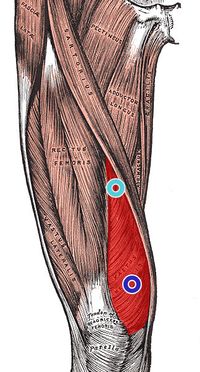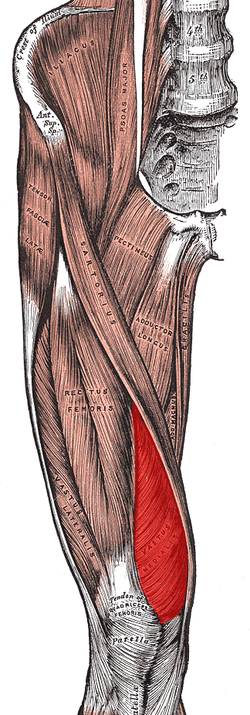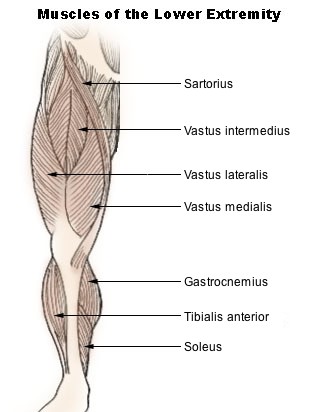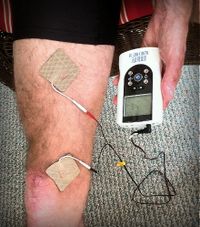VMO
The VMO is a subdivision of one of the four quadriceps muscles that is believed to impact the tracking of the kneecap and therefore a factor in knee pain.
Contents
1 Quadriceps
The quads consist of four muscles, shown below:
- Vastus lateralis (VL) on the outside of the thigh.
- Vastus medialis (VM) on the inside of the thigh.
- Vastus intermedius (VI) is between and below the vastus lateralis and vastus medialis at the front side of the thigh.
- Rectus femoris (RF) similar in line to the VI but closer to the surface and also covering the parts of the VL and VM that are towards the midline of the thigh.
2 The VMO
Part of the Vastus medialis that has the greatest angle to the kneecap is often considered as a separate muscle, the Vastus Medialis Obliquus or VMO. In reality the VMO is not a separate muscle, but a subdivision of the VM. There is some evidence that the VMO is activated by a separate nerve from the rest of the VM[1]. A relative weakness in the VMO has been linked to kneecap alignment[2] and therefore Knee Pain. It has also been observed that people with knee pain have a weaker VMO[3].
3 VMO Exercises
There have been many approaches in trying to find the best resistance exercise to strengthen the VMO relative to the other quad muscles. These approaches include using knee only or multiple joints (angle/knee/hip), eccentric, concentric or isometric exercise, and position of the limbs[4]. A review of the studies that looked at exercising the VMO was inconclusive[5]. Therefore it is hard to recommend any exercise that will strengthen the VMO relative to the other quad muscles. Of course, exercises that strengthen the quad muscles will tend to strengthen the VMO as well, but may not restore any imbalance. More importantly, the main reason for strengthening the VMO is knee pain, and most exercises to strengthen the quad put extra stress on the kneecap, aggravating the problem. Therefore, resistance training the quads is not recommended for those with knee pain[6].
4 Electrical Muscle Stimulation
Electrical Muscle Stimulation (EMS) is the direct of stimulation a muscle using an electric current that is applied via electrode patches on the skin. This allows for the stimulation of the VMO without activating the other quad muscles and without putting significant stress on the kneecap. The VMO is mostly superficial, so it is accessible for direct stimulation.
5 VMO Massage and Trigger Points
Massaging the VMO and its Trigger Points may help to restore muscle function and strength[7][8][9]. The VMO can easily be overlooked during routine massage, especially if a Foam Roller is used. The Foam Roller is a good way of massaging the other muscles in the quads, but it's hard to get to the VMO. The Stick is generally more effective for massaging the VMO, and the Thumper is great if you are having problems with specific Trigger Points in the VMO.

6 References
- ↑ Vastus medialis: anatomical and ... [J Manipulative Physiol Ther. 2006] - PubMed - NCBI http://www.ncbi.nlm.nih.gov/pubmed/16461173
- ↑ Role of the vastus medialis obliquus in repo... [Am J Sports Med. 2008] - PubMed - NCBI http://www.ncbi.nlm.nih.gov/pubmed/18337358
- ↑ Vastus Medialis Obliquus Atrophy: Does It Exist in Patellofemoral Pain Syndrome? http://ajs.sagepub.com/content/early/2011/04/12/0363546511401183
- ↑ ScienceDirect.com - Physical Therapy in Sport - The effect of limb position, exercise mode and contraction type on overall activity of VMO and VL http://www.sciencedirect.com/science/article/pii/S1466853X06000125
- ↑ VMO Exercises: A Systematic Review https://eidr.wvu.edu/etd/documentdata.eTD?documentid=5714
- ↑ Patellofemoral Pain Current Concepts: An Overview : Sports Medicine and Arthroscopy Review http://journals.lww.com/sportsmedarthro/Abstract/2001/10000/Patellofemoral_Pain_Current_Concepts__An_Overview.2.aspx
- ↑ Immediate effects of various physical ... [Arch Phys Med Rehabil. 2002] - PubMed - NCBI http://www.ncbi.nlm.nih.gov/pubmed/12370877
- ↑ Effectiveness of a home program of ischemic pressu... [Phys Ther. 2000] - PubMed - NCBI http://www.ncbi.nlm.nih.gov/pubmed/11002435
- ↑ http://www.sciencedirect.com/science/article/pii/S1360859205000690


